Local Produce
Kos Island, renowned for its fertile plains and warm climate, is a treasure trove of local produce, ranging from olives and honey to an array of fresh fruits and vegetables.
Kos, rich in agricultural heritage and traditional craftsmanship, is known for a variety of local products that reflect the island’s culture and natural resources. This Greek haven continues to uphold its legacy of agricultural abundance, inviting visitors to savour its rich flavours and traditional products.Some of the notable local products of Kos include:
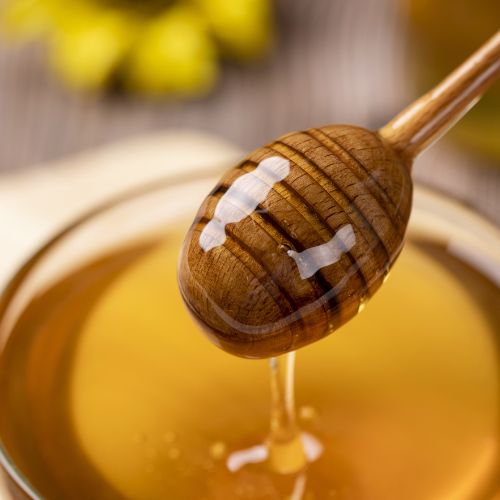
Honey
Kos’s honey, particularly its renowned thyme honey, is a treasure of the Dodecanese islands. This amber-hued delight is produced by bees that forage on the wild thyme, herbs, and flowers dotting the island’s landscape, resulting in a honey that is rich, aromatic, and distinctively flavoured. Thyme honey from Kos is not just a sweetener but a culinary experience surely not to be missed when visiting, reflecting the island’s unspoiled natural environment.
Beyond its use in Greek cuisine, where it’s drizzled over yogurt or used in pastries such as the traditional katimeria or loukoumades (Greek dough fritters), Kos honey, as well as beeswax, is also prized for its health benefits. Rich in antioxidants and antibacterial properties, both are used as staples in a variety of local home remedies and products. The production of honey on Kos is a tradition that involves time-honoured techniques, ensuring its purity and undisputed quality. The beekeepers of Kos, most of them family-run businesses, are deeply connected to their land and bees, fostering sustainable practices that have been passed down through generations.
Olive Oil
Kos’s olive oil is a testament to the island’s rich agricultural heritage. The island’s olive groves, basking in the Mediterranean sun, yield olives that are turned into some of the finest olive oil in Greece. This “liquid gold”, as called by Homer, is celebrated for its flavour, aroma, and nutritional properties, embodying the essence of the Mediterranean diet.
The olive oil production on Kos involves harvesting olives by hand to ensure minimal damage to the fruit, followed by cold pressing, a process that retains the oil’s natural flavours and health benefits. This oil is a staple in local cuisine, used in everything from salads to stews, adding depth and richness to dishes. The tree’s actual fruit, olives, also appear frequently in many dishes, either as an appetizer or a must-have salad ingredient. An indigenous olive variety worth seeking out and savouring is hamades, with quite a characteristic taste.
Olive oil is valued for its health benefits too, including heart-healthy fats and antioxidants. With evidence of strong anti-inflammatory effects, it’s recorded that Hippocrates himself used olive oil to heal wounds and treat illnesses.
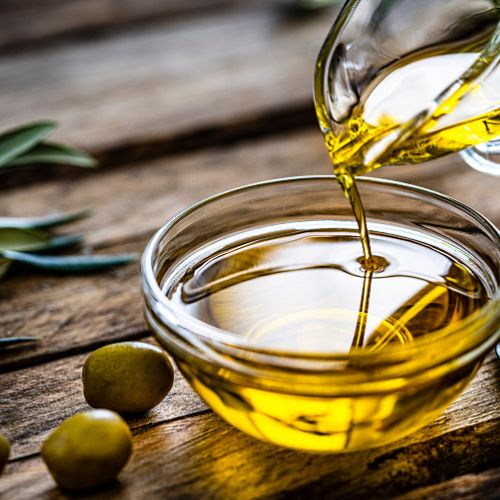

Olive Oil
Kos’s olive oil is a testament to the island’s rich agricultural heritage. The island’s olive groves, basking in the Mediterranean sun, yield olives that are turned into some of the finest olive oil in Greece. This “liquid gold”, as called by Homer, is celebrated for its flavour, aroma, and nutritional properties, embodying the essence of the Mediterranean diet.
The olive oil production on Kos involves harvesting olives by hand to ensure minimal damage to the fruit, followed by cold pressing, a process that retains the oil’s natural flavours and health benefits. This oil is a staple in local cuisine, used in everything from salads to stews, adding depth and richness to dishes. The tree’s actual fruit, olives, also appear frequently in many dishes, either as an appetizer or a must-have salad ingredient. An indigenous olive variety worth seeking out and savouring is hamades, with quite a characteristic taste.
Olive oil is valued for its health benefits too, including heart-healthy fats and antioxidants. With evidence of strong anti-inflammatory effects, it’s recorded that Hippocrates himself used olive oil to heal wounds and treat illnesses.

Wine
Local winemakers combine traditional methods with modern techniques, resulting in wines that are both authentic and of high quality. Wine tours and tastings are popular among visitors, offering a glimpse into the island’s winemaking process and the opportunity to sample different varieties. The wines of Kos, with their distinct flavours and aromas, are not just beverages but a celebration of the island’s rich agricultural and cultural landscape.
Cheese
The cheese-making process on Kos is steeped in time-honoured traditions and expertise. The result is a variety of cheeses that are not only rich in flavour but also versatile in their culinary applications. From the distinctively aromatic Krasotyri to other varieties such as white cheese, mizithra, and kefalotyri cheese, Kos’s cheeses are integral to Greek cuisine. They grace the island’s dining tables in many forms, ranging from simple, rustic appetizers to being key ingredients in more elaborate dishes.
Each cheese tells a story of the island’s natural bounty and the skill of its cheesemakers. Whether enjoyed on their own, paired with local wines, or used in cooking, the cheeses of Kos are a true reflection of the island’s gastronomic heritage and a delight for both locals and visitors alike.


Cheese
The cheese-making process on Kos is steeped in time-honoured traditions and expertise. The result is a variety of cheeses that are not only rich in flavour but also versatile in their culinary applications. From the distinctively aromatic Krasotyri to other varieties such as white cheese, mizithra, and kefalotyri cheese, Kos’s cheeses are integral to Greek cuisine. They grace the island’s dining tables in many forms, ranging from simple, rustic appetizers to being key ingredients in more elaborate dishes.
Each cheese tells a story of the island’s natural bounty and the skill of its cheesemakers. Whether enjoyed on their own, paired with local wines, or used in cooking, the cheeses of Kos are a true reflection of the island’s gastronomic heritage and a delight for both locals and visitors alike.
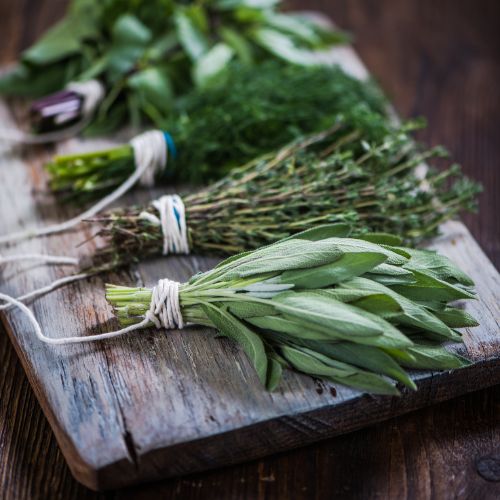
Herbs and Spices
The island of Kos, blessed with abundant sunshine and fertile soil, is a haven for a variety of native herbs, crucial to both its cuisine and traditional healing practices. Herbs such as oregano, thyme, rosemary, dittany, and sage, or alesfakia for locals, thrive in this idyllic environment, infusing the island’s dishes with rich flavours and aromas. These herbs are celebrated not just for their culinary uses but also for their medicinal properties, playing a significant role in Kos’s natural pharmacopoeia.
Local farmers and gatherers in Kos employ sustainable practices in harvesting these herbs, ensuring that their quality and potency are preserved. These aromatic herbs are often dried and packaged, making them a cherished souvenir for visitors who wish to bring a taste of the island’s flavours back home. Representing a deep connection to nature and longstanding traditions of natural healing, the herbs of Kos are a testament to the island’s rich botanical heritage.
Cinnamon Liqueur
The production of this liqueur reflects the fusion of traditional Greek flavours with skilled liquor-making, resulting in a soft drink that is both delightful and distinctive. Its popularity extends beyond the locals, appealing to visitors and connoisseurs who appreciate the depth and complexity of its flavour profile. “Kanelada” from Kos is not just an alcoholic beverage; it’s an embodiment of the island’s rich gastronomic culture and a renowned export that has garnered appreciation far and wide.
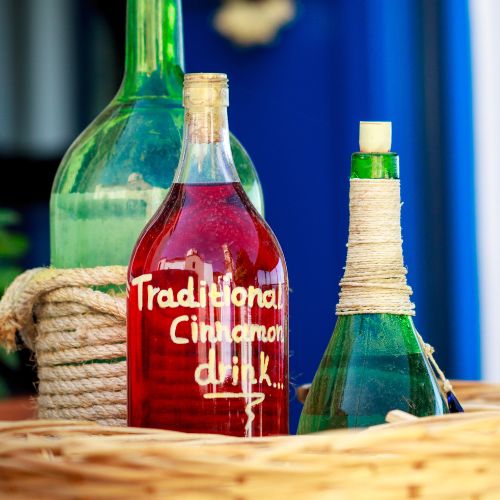

Cinnamon Liqueur
The production of this liqueur reflects the fusion of traditional Greek flavours with skilled liquor-making, resulting in a soft drink that is both delightful and distinctive. Its popularity extends beyond the locals, appealing to visitors and connoisseurs who appreciate the depth and complexity of its flavour profile. “Kanelada” from Kos is not just an alcoholic beverage; it’s an embodiment of the island’s rich gastronomic culture and a renowned export that has garnered appreciation far and wide.
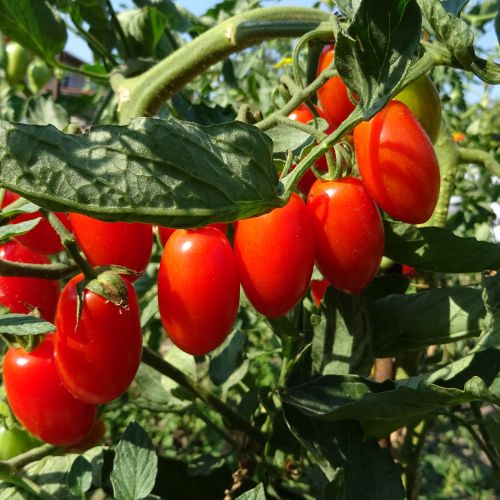
Tomatoes
One of the most cherished culinary delights and undoubtedly Kos’ trademark is the traditional tomato spoon sweet, known locally as “glyko ntomataki” – in other words, sweetened and syrupy tomatoes. This unique confection is a testament to the island’s ingenuity in utilizing its abundant, sun-ripened tomatoes. The process of making “ntomataki” involves slow cooking “vergaki” tomatoes blended with sugar, clove, cinnamon, vanilla, almonds, and a hint of lemon juice, transforming them into a luscious, jam-like treat. The resulting delicacy strikes a perfect balance between the natural tanginess of the tomatoes and the sweetness of the syrup, creating a flavour profile that is both surprising and delightful. Traditionally served as a dessert or a sweet accompaniment to coffee, “glyko ntomataki” is not just a food item but a reflection of Kos’s culinary heritage, showcasing the island’s ability to turn simple ingredients into extraordinary creations. This tomato sweet is a beloved treat among locals and a must-try for any visitor, offering a characteristic taste of Kos’s gastronomic culture.
Aloe Vera
The mediterranean climate with mild temperatures and mineral-rich Aegean winds that Kos Island presents, is ideal for cultivating aloe vera. 100% organically grown aloe vera from Kos is used for a variety of products, such as pure food supplements, handmade marmalades and jams, sunburn soothing gels, as well as other skin care products. The open to visitors aloe vera farms are found around the area of Asfendiou – Pyli.
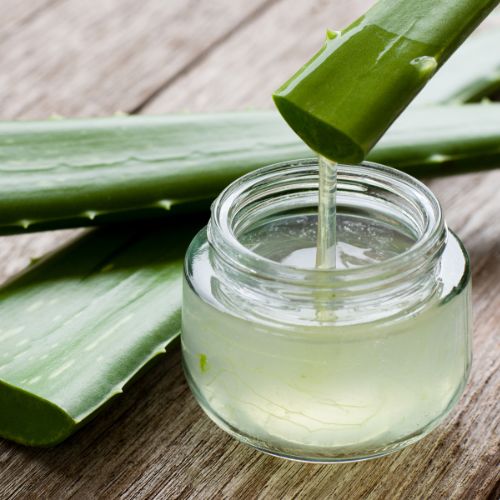

Aloe Vera
The mediterranean climate with mild temperatures and mineral-rich Aegean winds that Kos Island presents, is ideal for cultivating aloe vera. 100% organically grown aloe vera from Kos is used for a variety of products, such as pure food supplements, handmade marmalades and jams, sunburn soothing gels, as well as other skin care products. The open to visitors aloe vera farms are found around the area of Asfendiou – Pyli.
